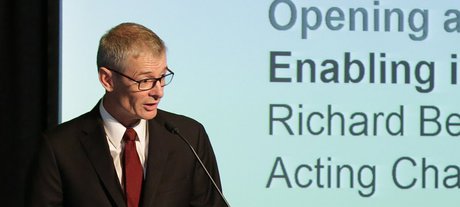Towards a new spectrum management framework
By Richard Bean, Acting Chairman, ACMA
Monday, 23 May, 2016

From superfast broadband to driverless vehicles, a new generation of satellites to the fast-approaching introduction of 5G, and the Internet of Things (IoT) to smart cities, the RadComms 2016 conference was centred on discovery, disruption and demand — fitting for its theme, Spectrum Reform: Enabling Innovation.
That might sound a bit banal, but the fact is that innovations enabled by wireless communications we have previously only imagined — and maybe were beginning to think might never happen — are now simply a matter of time.
As an example, I showed delegates an extraordinary video clip of the newest Atlas robot from Boston Dynamics. I could have shown a clip of a Google car or a Rio Tinto autonomous truck in the Pilbara. What would they have had in common? Impossible without radiocommunications. Of course, it also illustrates true disruption, and the foundation for this phenomenon was very familiar to everyone at RadComms — broadband connectivity and mobility.
The IoT is an exciting area of growth with the potential for billions of everyday objects to send and receive data through connected networks. Spectrum opportunities and risks for the IoT were discussed at RadComms, including the identification of approaches that could be used to minimise interference from non-compliant equipment. These included the default adoption of ‘lowest common denominator’ frequency ranges by manufacturers of IoT devices (such as 915–928 MHz for devices operating in the 900 MHz band), as well as the development of low-cost techniques to enable devices to automatically self-configure to frequency ranges suitable for the country of operation.
This discussion built on changes proposed by the ACMA late last year to provide easier access to spectrum for low-power wide area networks that support machine-to-machine communications in the IoT.
The ACMA is also driving innovation in the way essential and emergency services are delivered in the 400 MHz band. These services rely heavily on radiocommunications. The provision of harmonised spectrum for government use in this band has enabled the adoption of new and more effective technologies, able to deliver additional information through data, more robust voice communications and increased levels of interoperability among related services.
Importantly, the federal government aims to further enhance the innovative potential of spectrum through implementing the recommendations of its Spectrum Review. Senator the Hon. Mitch Fifield, Minister for Communications, in a keynote address, spoke about the government’s response to the review producing “a more flexible and responsive spectrum management framework”.
The Department of Communications and the Arts conducted the review with the ACMA. The review reported in May last year and the government’s response was announced in August.
In his speech, Minister Fifield released the government’s Legislative Proposals Consultation Paper for the Radiocommunications Bill 2016. It is the next step before the development of an Exposure Draft of new legislation to make Australia’s spectrum framework simpler, more efficient and flexible.
The ACMA is working closely with the Department of Communications and the Arts on the implementation of the review, including the supplementary reviews the department is conducting into spectrum pricing and Commonwealth government spectrum use. The implementation of the Spectrum Review provides great opportunities — opportunities we relish — for the ACMA to develop a more efficient and effective spectrum management framework to benefit spectrum users and the Australian community more generally.
RFUANZ report: setting the frequency for success in 2025
Last year brought a lot of internal change for RFUANZ, but the association has hit the ground...
ARCIA update: an extended event calendar for 2025
With the addition of Tasmanian events and a conference in Adelaide in September, 2025 will see...
ARCIA update: plans for 2025
ARCIA will be holding a mixture of workshop, conference and networking events in 2025, in the...





